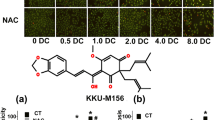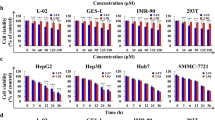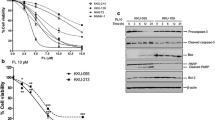Abstract
Low efficacy and high resistance rate associated with existing chemotherapeutic drugs enforce a requirement for novel therapeutic strategies for extremely aggressive cholangiocarcinoma (CCA). In the present study, the apoptosis-inducing activity of cucurbitacin B, a compound derived from plants of Cucurbitaceae family, against KKU-100 CCA cells and the underlying mechanism mediating its effect were investigated. The results showed that cucurbitacin B significantly decreased CCA cells viability by induction of apoptosis. Increased apoptotic cell death following cucurbitacin B treatment was correlated with caspase-9 and caspase-3 activations, Bax upregulation, increased cytochrome c, apoptosis-inducing factor release, and decreased Bcl-2 and Bcl-XL levels, suggesting activation of the mitochondrial-mediated apoptosis pathway. Further molecular analyses revealed that cucurbitacin B inhibited focal adhesion kinase (FAK), which is an important regulator of the apoptosis process, and its downstream pathway, PI3K/Akt. Knockdown of FAK expression by small interfering RNA appeared to induce CCA cell apoptosis which was accompanied with elevated level of cytochrome c and cleaved caspase-9, and decreased level of Bcl-2, phospho-PI3K, and phospho-Akt. Taken together, cucurbitacin B induces an intrinsic mitochondrial apoptosis pathway in CCA cells partly through suppression of FAK-mediated oncogenic signaling. This compound should be considered as a candidate agent for CCA treatment.





Similar content being viewed by others
References
Benjakul R, Kongkaneramit L, Sarisuta N, Moongkarndi P, Muller-Goymann CC (2015) Cytotoxic effect and mechanism inducing cell death of alpha-mangostin liposomes in various human carcinoma and normal cells. Anti-Cancer Drugs 26:824–834
Cai Y, Fang X, He C, Li P, Xiao F, Wang Y, Chen M (2015) Cucurbitacins: a systematic review of the phytochemistry and anticancer activity. Am J Chin Med 43:1331–1350
Cheng L, Xu PH, Shen BD, Shen G, Li JJ, Qiu L, Liu CY, Yuan HL, Han J (2015) Improve bile duct-targeted drug delivery and therapeutic efficacy for cholangiocarcinoma by cucurbitacin B loaded phospholipid complex modified with berberine hydrochloride. Int J Pharm 489:148–157
Guo J, Zhao W, Hao W, Ren G, Lu J, Chen X (2014) Cucurbitacin B induces DNA damage, G2/M phase arrest, and apoptosis mediated by reactive oxygen species (ROS) in leukemia K562 cells. Anti Cancer Agents Med Chem 14:1146–1153
Hassan M, Watari H, AbuAlmaaty A, Ohba Y, Sakuragi N (2014) Apoptosis and molecular targeting therapy in cancer. Biomed Res Int 2014:150845
Hata AN, Engelman JA, Faber AC (2015) The BCL2 family: key mediators of the apoptotic response to targeted anticancer therapeutics. Cancer Discov 5:475–487
Kim LT, Fleming JB, Lopez-Guzman C, Nwariaku F (2003) Focal adhesions and associated proteins in medullary thyroid carcinoma cells. J Surg Res 111:177–184
Kittiratphatthana N, Kukongviriyapan V, Prawan A, Senggunprai L (2016) Luteolin induces cholangiocarcinoma cell apoptosis through the mitochondrial-dependent pathway mediated by reactive oxygen species. J Pharm Pharmacol 68:1184–1192
Kong D, Chen F, Sima NI (2015) Inhibition of focal adhesion kinase induces apoptosis in bladder cancer cells via Src and the phosphatidylinositol 3-kinase/Akt pathway. Exp Ther Med 10:1725–1731
Lee BY, Timpson P, Horvath LG, Daly RJ (2015) FAK signaling in human cancer as a target for therapeutics. Pharmacol Ther 146:132–149
Li J, Meng Q, Sun Y, Qing H (2013) Inhibition of focal adhesion kinase induces apoptosis in human gastric carcinoma cells (SGC-7901). Mol Biol Rep 40:401–406
Miller K, Clementi C, Polyak D, Eldar-Boock A, Benayoun L, Barshack I, Shaked Y, Pasut G, Satchi-Fainaro R (2013) Poly (ethylene glycol)-paclitaxel-alendronate self-assembled micelles for the targeted treatment of breast cancer bone metastases. Biomaterials 34:3795–3806
Murakami Y, Sonoda K, Abe H, Watari K, Kusakabe D, Azuma K, Kawahara A, Akiba J, Oneyama C, Pachter JA, Sakai K, Nishio K, Kuwano M, Ono M (2017) The activation of SRC family kinases and focal adhesion kinase with the loss of the amplified, mutated EGFR gene contributes to the resistance to afatinib, erlotinib and osimertinib in human lung cancer cells. Oncotarget 8:70736–70751
Ohta R, Yamashita Y, Taketomi A, Kitagawa D, Kuroda Y, Itoh S, Aishima S, Maehara Y (2006) Reduced expression of focal adhesion kinase in intrahepatic cholangiocarcinoma is associated with poor tumor differentiation. Oncology 71:417–422
Qu Y, Cong P, Lin C, Deng Y, Li-Ling J, Zhang M (2017) Inhibition of paclitaxel resistance and apoptosis induction by cucurbitacin B in ovarian carcinoma cells. Oncol Lett 14:145–152
Shi M, Zhang H, Li M, Xue J, Fu Y, Yan L, Zhao X (2011) Normal endometrial stromal cells regulate survival and apoptosis signaling through PI3K/AKt/Survivin pathway in endometrial adenocarcinoma cells in vitro. Gynecol Oncol 123:387–392
Shukla S, Khan S, Kumar S, Sinha S, Farhan M, Bora HK, Maurya R, Meeran SM (2015) Cucurbitacin B alters the expression of tumor-related genes by epigenetic modifications in NSCLC and inhibits NNK-induced lung tumorigenesis. Cancer Prev Res 8:552–562
Sinha S, Khan S, Shukla S, Lakra AD, Kumar S, Das G, Maurya R, Meeran SM (2016) Cucurbitacin B inhibits breast cancer metastasis and angiogenesis through VEGF-mediated suppression of FAK/MMP-9 signaling axis. Int J Biochem Cell Biol 77:41–56
Sonoda Y, Watanabe S, Matsumoto Y, Aizu-Yokota E, Kasahara T (1999) FAK is the upstream signal protein of the phosphatidylinositol 3-kinase-Akt survival pathway in hydrogen peroxide-induced apoptosis of a human glioblastoma cell line. J Biol Chem 274:10566–10570
Sookprasert A, Chindaprasert J, Wirasorn K (2012) Systemic therapy for locally advanced and metastatic cholangiocarcinoma. Asian Pac J Cancer Prev 13 Suppl:3–6
Sripa B, Pairojkul C (2008) Cholangiocarcinoma: lessons from Thailand. Curr Opin Gastroenterol 24:349–356
Sripa B, Brindley PJ, Mulvenna J, Laha T, Smout MJ, Mairiang E, Bethony JM, Loukas A (2012) The tumorigenic liver fluke Opisthorchis viverrini--multiple pathways to cancer. Trends Parasitol 28:395–407
Tusskorn O, Prawan A, Senggunprai L, Kukongviriyapan U, Kukongviriyapan V (2013) Phenethyl isothiocyanate induces apoptosis of cholangiocarcinoma cells through interruption of glutathione and mitochondrial pathway. Naunyn Schmiedeberg's Arch Pharmacol 386:1009–1016
Ulukaya E, Acilan C, Yilmaz Y (2011) Apoptosis: why and how does it occur in biology? Cell Biochem Funct 29:468–480
Vrhovac Madunic I, Madunic J, Antunovic M, Paradzik M, Garaj-Vrhovac V, Breljak D, Marijanovic I, Gajski G (2018) Apigenin, a dietary flavonoid, induces apoptosis, DNA damage, and oxidative stress in human breast cancer MCF-7 and MDA MB-231 cells. Naunyn Schmiedeberg's Arch Pharmacol 391:537–550
Wang J, Zu J, Xu G, Zhao W, Jinglong Y (2014) Inhibition of focal adhesion kinase induces apoptosis in human osteosarcoma SAOS-2 cells. Tumour Biol 35:1551–1556
Zhang ZR, Gao MX, Yang K (2017) Cucurbitacin B inhibits cell proliferation and induces apoptosis in human osteosarcoma cells via modulation of the JAK2/STAT3 and MAPK pathways. Exp Ther Med 14:805–812
Zhou Q, Guo X, Choksi R (2017) Activation of focal adhesion kinase and Src mediates acquired Sorafenib resistance in A549 human lung adenocarcinoma xenografts. J Pharmacol Exp Ther 363:428–443
Acknowledgements
The authors would like to thank Prof. James A. Will, University of Wisconsin-Madison, for editing the manuscript via the English Editing Publication Clinic, Faculty of Medicine, Khon Kaen University, Thailand.
Funding
This study was supported by the Thailand Research Fund (MRG6080008) and the grant from Khon Kaen University, Thailand (KKU592604). Sirinapha Klungsaeng holds a scholarship from Graduate School, Khon Kaen University, Thailand (581H217).
Author information
Authors and Affiliations
Contributions
SiK and LS conceived and designed research and conducted experiments. VK and AP contributed new reagents or analytical tools. SiK, VK, AP, SaK, and LS analyzed data and interpreted the results. SiK and LS wrote the manuscript. All authors read and approved the manuscript.
Corresponding author
Ethics declarations
Conflict of interest
The authors declare that they have no conflict of interest.
Rights and permissions
About this article
Cite this article
Klungsaeng, S., Kukongviriyapan, V., Prawan, A. et al. Cucurbitacin B induces mitochondrial-mediated apoptosis pathway in cholangiocarcinoma cells via suppressing focal adhesion kinase signaling. Naunyn-Schmiedeberg's Arch Pharmacol 392, 271–278 (2019). https://doi.org/10.1007/s00210-018-1584-3
Received:
Accepted:
Published:
Issue Date:
DOI: https://doi.org/10.1007/s00210-018-1584-3




